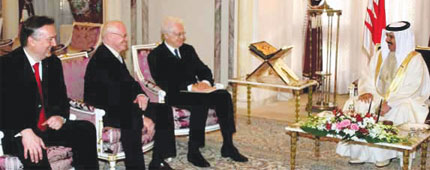
|
 |
 |
|
|
|
|
|
|
|
|
|
|
|
|
|
|
|
|
|
|
|
|
|
|
Club of Madrid Recommends Dialogue, Amendment, and Adherence to the LawThe Club of Madrid is a new and independent organization which was established in Madrid six years ago. This initiative was put together with the participation of 50 democratically elected former Heads of State and Prime Ministers, and currently their number has reached around 74. The club aims to strengthen democracy, promote political reforms and establish dialogue between governments and political oppositions all over the world. This can be achieved by drawing on the experiences and resources of the club's members as well as the evaluation of new and emerging democracies in particular. The Club has decided to direct its interest towards three Arab countries which have taken major steps towards democracy, and feels that they can benefit from the club member states' experience. These Arab counties are Bahrain, Morocco and Jordan, and the Club presented all three with its suggestions after examining their individual processes of transformation into fully fledged democracies.
A delegation from the Club visited Bahrain three times last year and consisted of three former Prime Ministers: from Latvia Mr. Valdis Birkavs, from Bosnia and Herzegovinia Mr. Zlatko Lagumdzija and from France Mr. Lionel Jospin. During their visits to Bahrain they met with representatives from the government and civil society organizations, conducted meetings and organised debates and workshops, which included the participation of all interested parties. The delegation presented their opinions and experiences to the Kingdom of Bahrain in the form of recommendations included in a report which was handed directly to the King on 15 February 2009. The recommendations included the following points: 1- The need to institutionalize regular and sustained dialogue in order to build confidence between the various parties and stakeholders. In other words, to open channels of dialogue between officials in the government, civil society organizations and other parties –as the Prime Minister of Latvia put it- as well as emphasizing that the genuine change does not come across the decrees, but through dialogue. 2- The amendment of some laws which restrict public freedoms, including those related to political societies and freedom of assembly, to be achieved exclusively through dialogue. 3- The Emphasis on the code of ethics that governs the activity of media. 4- The report recommended that the government provide constant and regular support to political societies in order to develop their capacities to perform their required role in advancing the political process. 5- It also recommended that political societies adhere to laws in force, and to conduct their activities and national agenda away from all forms of sectarianism. 6- Finally, the report recommended that the government ensure the independence of the judicial system. It is obvious that all these recommendations are fair and balanced as they fulfil the government’s requirements, such as calling upon all political organisations to adhere to the law, to refrain from sectarian bias, and for those working in the media, to adhere to the code of ethics which governs their activities. These recommendations do not only concern the government but also political and civil societies as well. This point was emphasized even more in the announcements of some officials of the Club of Madrid following the delivery of the recommendations to the King. During a press conference organized by the delegation of the Club of Madrid following the meeting with the King, the former Prime Minister of Latvia said that Bahraini civil society organizations had asked the delegation to pass on their own ideas and visions to the political leadership regarding dialogue with the Government and the freedom to establish societies. He noted that one should not be hasty during the endorsement or implementation of the legislations for 'there are some problems that may impede the process of approving legislation, and this applies equally to legislations related to media, political societies and assembly in Bahrain'. He continued by saying that these legislation amendments are on the agenda of the legislative authority. Mr Valdis Birkavs also explained that the implementation of the delegation’s proposals should not lead to a state of instability in the country, saying that ‘unfortunately, some believe that the recommendations mentioned in our report should be applied immediately.’ He also expects to return to Bahrain soon saying ‘as we have received another royal invitation, which is proof enough of the political authority’s willingness to allow us to continue our recommendations. It is also clear that His Royal Highness fully supports the project we have presented to him’. As for the former Prime Minister of Bosnia and Herzegovina, he commented that ‘it is not our job to interrogate or enforce our opinions; rather it is to contribute to the local expertise here, so that Bahrain can become a more democratic country’. Institutionalising the dialogue between the Government and civil society organisations represents a password of sorts, through which it is possible to agree upon the required legislative amendments and others, although it seems that the Government prefers to achieve this exclusively through the parliament gate, which is not wide enough. |
